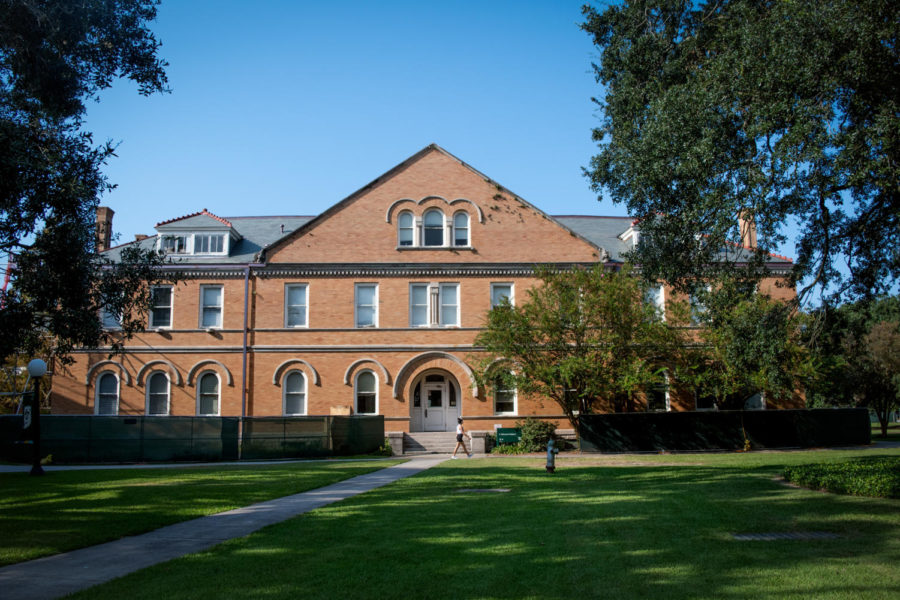Hebert Hall signs unofficially changed, then reversed, in controversy
September 21, 2022

This month, the signs outside of F. Edward Hebert Hall on the Academic Quadrangle read “Gwendolyn Midlo Hall.” This week, those signs were changed, and the building signs once again display the Hebert name.
The switches come amid a back-and-forth between the History and Latin American Studies students and faculty and Tulane University’s administration. For years, faculty and students have pushed for Hebert Hall to be renamed to “Gwendolyn Midlo Hall Building,” after the highly regarded historian and activist who focused her works on Black enslavement.
The Hall signs, which blended into the existing Hebert sign so seamlessly the change almost appeared permanent, were in fact temporary. They appear to have been placed by faculty who wanted to honor Hall’s passing on Aug. 29.
“The name of F. Edward Hébert Hall has not changed,” Mike Strecker, assistant vice president for communications at Tulane, said.
The renaming effort dates back years. On June 20, 2020, a green banner hung out of the building’s windows with the sign, “Gwendolyn Midlo Hall Building.” An observing pedestrian might have thought the name of Hebert Hall had been officially changed; yet, it was merely a push by History and Latin American Studies students to encourage Tulane to act.
Students of Tulane’s Undergraduate Student Government drove the unofficial name change in 2020 and passed legislation in 2017 to request the renaming of the building. A 1924 Tulane graduate, and later a long-serving member of the U.S. House of Representatives, F. Edward Hébert remains controversial for his ardent stance as a segregationist in opposition to the Civil Rights movement. Students and faculty alike have questioned the rationale behind housing the university’s Center for Academic Equity within a building under his name.
In July 2020, in response to the students and faculty’s symbolic protest, President Mike Fitts commissioned a Building Naming Task Force to inform decisions on naming or renaming Tulane buildings. According to Strecker, upon heavy consideration, the task force recommended removing the Hébert name as the designation of the hall if legally possible.
The task force then called for the conduction of extensive historical research to represent Hébert’s beliefs, values and actions in reflection to the university values. The report backed student critiques of Hébert’s opposition to federally-protected civil rights under the guise of a belief in “states rights.” Following the task force’s recommendation, Strecker said Tulane leadership is in negotiation with the Hébert family regarding the name of the building, although no concrete action has yet been taken.
This week, signs in front of Hebert Hall temporarily marked the building “Gwendolyn Midlo Hall Building.” Hall’s most valuable contributions to the field included her discovery and creation of an enslavement database from 18th century Louisiana which preserved the identities of enslaved people for generations to come and revolutionized historians’ understandings of Louisiana’s cultural roots.
“She developed a really robust interest and skill in digital humanities and what we can do with data and computerized models and computerized systems for understanding African lives,” Dr. Laura Adderley, an associate professor in the history department who has fought for the renaming since 2020, said.
Hall was a Tulane graduate and New Orleans native who has already touched the lives of many students and community activists around the world. Renaming the building, Adderley said, would be “such a remarkable opportunity for the university.”






















Leave a Comment